Apparently, the best times of the Safari browser are behind
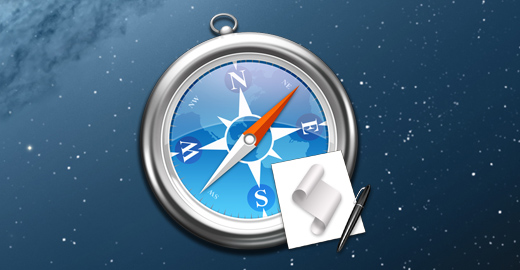
Steve Jobs called Safari the best browser on the planet. Of course, not everyone agrees with him. But at one time this browser was able to go beyond the Apple ecosystem and was hospitably received by Windows users. Today, the browser is held in high esteem not only among desktop users, but also among owners of mobile devices based on iOS. The most popular browsers can be counted on the fingers of one hand. Safari is one of them.
If Apple were a little less ambitious (which was impossible to imagine under Jobs) and compliant, Safari might never have come into being. In the early 2000s, the company decided that any dependence on strong competitors hindered development. Thus, in 2003, Apple took a tough and uncompromising position in relation to Microsoft, flatly refusing to renew its contract for using Microsoft Internet Explorer for Mac OS X. Jobs’s company secretly created everyone’s own Internet browser. The work was conducted in an atmosphere of utmost secrecy.
')
Behind the Seven Seals
Back in 2002, when Dave Hut was prudently invited to the company. This is a legendary personality in the browser developer community. Prior to Apple, he worked for Netscape from 1997 to 2002.
Switching to another IT company of a developer of this level could not go unnoticed. Gossip and rumors appeared. There was no direct "evidence", and there could not be, since the secrecy of the project was just kind of going wild. Therefore, the public had no choice but to chew on the same rumors about the development of a new product several times and read on the coffee grounds.
As Don Melton, who led the Safari team at the time, recalls, ordinary employees (not involved in the development) had no chance to learn the details. The Safari team has just not been locked up, but nevertheless a strict non-disclosure subscription was taken from each employee. It got to the point that the browser was launched only in private, and all logs were immediately erased. They even had to conceal their IP addresses so that the curious webmasters would not “see through” a spike of incomprehensible activity from Apple. Stirlitz would envy such a conspiracy.
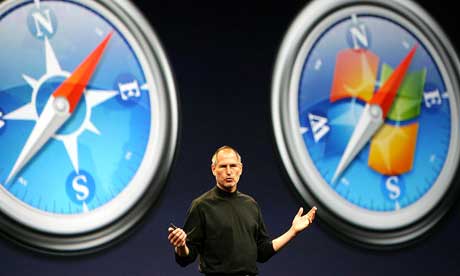
The fact is that Steve Jobs was going to blow up another public interest bomb, and therefore insisted on strict observance of secrets. And the bomb exploded!
From the shadows - to the market
Safari's beta browser for Mac OS X Jobs demonstrated at the Macworld conference.
The novelty was greeted with joy. Users realized that Safari had left Microsoft Internet Explorer far behind.

The new browser was developed on the basis of the open engine WebKit, which served as the basis for other browsers: Google Chrome, Chromium and Yandex. This engine, of course, is the most successful due to its speed and stability. Its advantage in the performance of Apple developers are also visual effects characteristic of Mac OS.
Shortly after Safari appeared, work on Internet Explorer for Mac was discontinued.On April 14, 2003, the second public beta was released. It implemented features such as auto-completion of forms, tabs, the ability to clear the cache and cookies, import bookmarks from Netscape and Mozilla, improved support for web standards and AppleScript.
On June 23, 2003, the first official release finally appeared. Version 1.0 added support for iSync synchronization bookmarks, added all Mac OS X localizations, expanded support for AppleScripts to control the web browser, and improved support for web standards.
A separate story is associated with the choice of names for the browser. The name Safari was not approved immediately. The draft name of the project was Alexander, it was under him that he went through all the stages of development and testing. Then there was the idea to call the browser Freedom. The idea failed due to the fact that in the United States this name was associated with the popular series of feminine hygiene products. As a result of brainstorming, a variant of “Safari” appeared, which Jobs himself later approved.
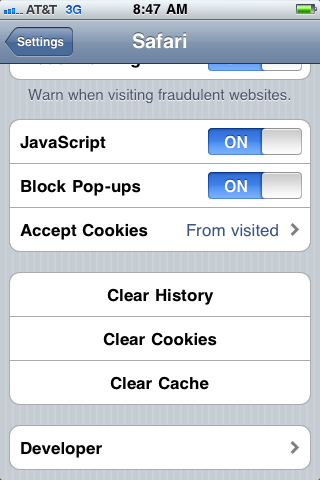
In 2008, a mobile version of Safari for iOS devices appeared.
Safari for Windows
Historically, in the community of owners of Apple devices, there is a special relationship to the company's software products: they are all rather closed with respect to the ecosystem. A new browser was supplied with the company's products. Everyone who owned the "apple" gadgets, by that time fell in love with Safari. The full members of the ecosystem certainly brought most of the profits, but in 2007 Steve Jobs decided to take Safari out of the community.
A huge market of Windows users opened up attractive prospects for the browser. Jobs in 2007 announced Safari for Windows XP and Windows Vista operating systems. He hoped that he could press the players in the new field.
The public has adopted Safari for Windows with joyful enthusiasm. A year later, the browser from Cupertino pressed the original inhabitants of this operating system - Internet Explorer and Mozilla Firefox, taking 6% of the total browser market. Such a good start inspired optimism.
In addition to the active advertising of the browser itself, Jobs simultaneously popularized Apple and its operating system (Safari interface elements were made in the style of Mac OS), as if luring new members to their ecosystem.
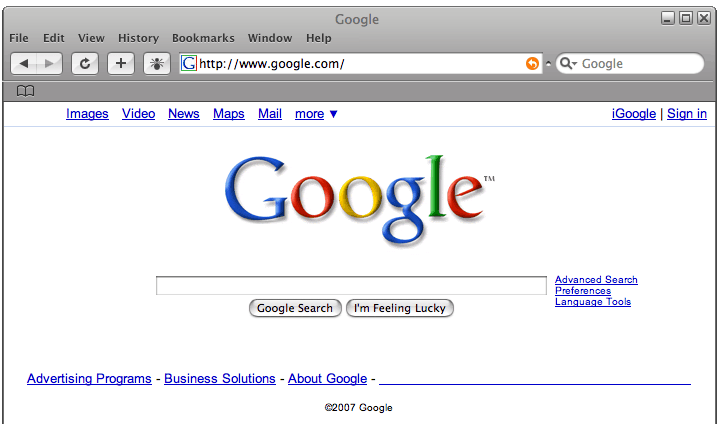
The appearance of the program was very different from the usual form of programs in Windows: interface elements (buttons, scroll bars, input fields, drop-down menus, checkboxes, and others) were made in the style of Mac OS X (Aqua interface). Also, in version 3.x for Windows, a proprietary font-smoothing system was used (in versions 4.x, 5.x for Windows, you can choose between the font-smoothing system from Apple or Microsoft). In the latest versions 4.0, the program interface has been converted to a more familiar Windows user, and the color of the design has changed to a lighter one.
Terminate Windows Versioning
Whoever will find advantages in this, someone is solid minuses, but history does not tolerate subjunctive moods: having collected a lot of good reviews and awards on Windows platforms for 4 years, Safari in 2011 still left this market.
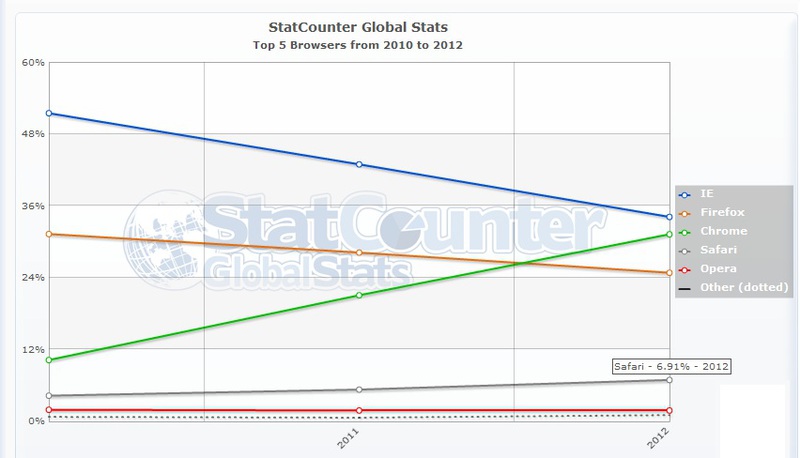
On July 26, 2012, Apple officially notified all browser users that version 5.1.7 will be the latest release for Windows. The development of new versions has been completely discontinued, and the browser once again began to develop exclusively within the Apple ecosystem.
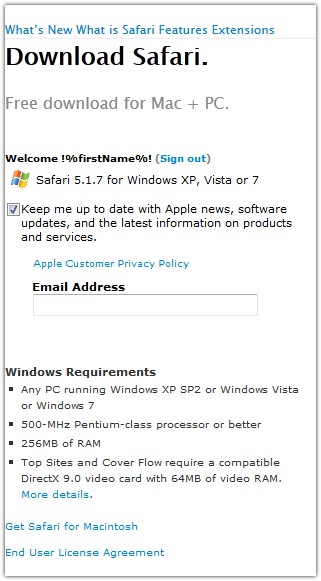
Apple has ceased to support the Windows version of its Internet browser silently, as they say, without noise and dust. After the release of the long-awaited OS X Mountain Lion, all references to the PC version of the Safari browser disappeared from the Apple site. That is, in general, all - direct and indirect.
What made Apple completely abandon support for Safari on a PC? Why refuse a program that does not require ongoing technical support? The most common version is this: the browser has not received the level of popularity, which was expected in Apple. And perhaps the plan to entice users to Mac OS failed.
After that, some users began to fear for another product of the company: “who knows, what if Windows users will soon be denied the use of iCloud?”
The Windows platform was the only one that browser developers “condescended” to. Apple has not released Safari for Linux or Android.
Criticism from the past
Recall what we wrote at that time about the “pluses” and “minuses” of the browser in one of the reviews:
Benefits
Safari is launched by default in a fairly compact form, its window takes up only three-quarters of the screen area, automatically adjusting the entire content of web pages to the window.
The browser supports multiple tabs at the same time, performs a search through the built-in tools (Google - on Mac OS X, Google or Yahoo - on Windows), has the ability to block pop-up windows and synchronize the address books of Mac and Windows.
For users who want to be incognito on the Internet, a private browsing function has been developed, that is, a mode in which cookies are not accepted, the history of visits is not maintained, and input data (including passwords) is not remembered.
Among other positive qualities of Safari are the presence of a built-in RSS aggregator and the possibility of scaling the input area.
In addition, the browser automatically recognizes web pages with non-standard fonts, supports CSS3 and HTML5 standards, integrates QuickTime and has the Cover Flow function.
Other positive features of Safari are Snapback, which allows you to return to the original search results, and Web Inspector, which allows developers and users to view DOM web pages. I think you need to remember about the possibility of checking spelling in text fields.
disadvantages
Safari has a very boring interface.
Safari is very hard to use.
Safari speed is not available to users with GPRS connections. Safari is significantly inferior to its counterparts, sometimes without opening the page at all, when other browsers successfully cope with the task.
The Safari Top Sites feature is very picky about the hardware capabilities of the computer - many owners of devices with low video system characteristics will not see it.
There are no security zones and the ability to disable expansion modules.
Unpredictability when opening pages optimized for Mozilla Firefox and Internet Explorer.
Slow launch of the browser and the inability to copy the contents of the web page completely.
But it was all over 5 years ago. Although since 2012, oddly enough, significant changes in the browser for a long time did not occur.
Safari today
In early July, along with beta versions of new and old operating systems, Apple released the next version of the browser Safari Technology Preview. This browser is designed for developers who want to get acquainted with the web technologies of the future and prepare their products to work with them.
According to the information on the Apple site, the new version of Safari Technology Preview contains code snippets for the implementation of future support for Apple Pay and the integration of this payment system for sites.
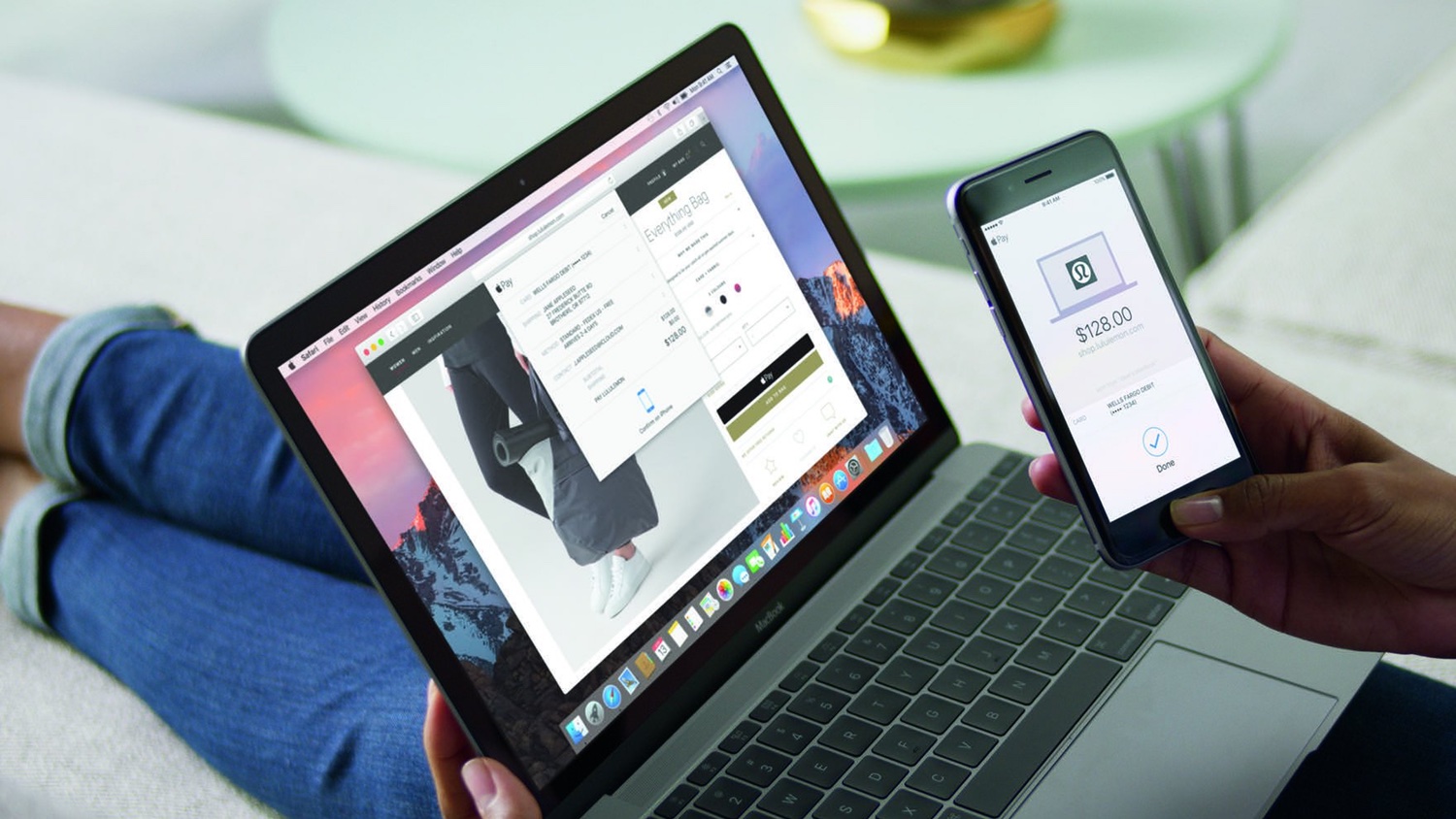
The ability to integrate Apple Pay for sites was presented at WWDC 2016, and it will become part of Safari 10, which users will receive along with a free update on macOS Sierra this fall, says appleinsider.ru.
Commercial break
Analysts at Goldman Sachs say that Google is seeking to grow in the online advertising market through collaboration with Apple. Moreover, the companies made a deal, according to which Google search engine is now pre-installed in Safari browser by default.
In 2015, Google’s revenues from mobile search advertising reached $ 11.8 billion. According to analysts at Goldman Sachs, the company has earned almost $ 9 billion thanks to iPhone and iPad users. Safari provided half of this amount.
Ratings
According to the latest research, it became known that American users began to actively switch to the “apple” browser. It is reported macdigger.ru with reference to the Digital Analytics Program. In an analytical agency reported that the share of the Safari browser in the United States rose to the level of 21.9%, moving Internet Explorer to third place with a score of 20.1%. Google Chrome continues to lead the United States, accounting for 43.1% of the US browser market.
However, TopTen Reviews allocates places differently:
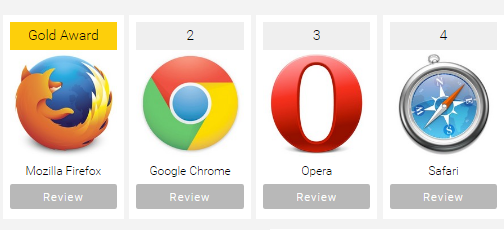
StatCounter maintains its statistics, accounting for more than 15 billion web page views on 3 million sites.
According to StatCounter, Chrome has long been the leader in the global browser market, whose share in June 2016 rose to 58.26%. The second position is Firefox (almost 14%). The third line is shared by Internet Explorer and Safari, which earned about 9.7% of the traffic last month.
Source: https://habr.com/ru/post/310118/
All Articles